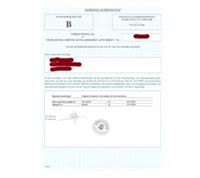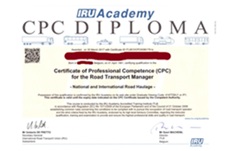Government Obligations for Starting a Transport Company in Belgium
 Belgium's strategic location at the heart of Europe makes it an ideal base for transport and logistics companies. However, starting a transport company in Belgium requires compliance with several legal and administrative obligations. These ensure that the operations are safe, environmentally responsible, and economically viable. Below is an extended guide to the requirements and steps involved in starting a transport company in Belgium.
Belgium's strategic location at the heart of Europe makes it an ideal base for transport and logistics companies. However, starting a transport company in Belgium requires compliance with several legal and administrative obligations. These ensure that the operations are safe, environmentally responsible, and economically viable. Below is an extended guide to the requirements and steps involved in starting a transport company in Belgium.
Business Registration
Before commencing operations, you must establish a legal business entity:
- Company Formation:
-
 Register your company with the Belgian Crossroads Bank for Enterprises (Kruispuntbank van Ondernemingen / Banque-Carrefour des Entreprises). This creates an official record of your business and provides you with a unique company registration number. Kruispuntbank van Ondernemingen
Register your company with the Belgian Crossroads Bank for Enterprises (Kruispuntbank van Ondernemingen / Banque-Carrefour des Entreprises). This creates an official record of your business and provides you with a unique company registration number. Kruispuntbank van Ondernemingen
- VAT Registration:
-
 All businesses in Belgium must obtain a VAT identification number from the Federal Public Service Finance (FOD Financiën / SPF Finances). Transport companies often deal with cross-border transactions, making VAT compliance particularly important. FOD Financiën
All businesses in Belgium must obtain a VAT identification number from the Federal Public Service Finance (FOD Financiën / SPF Finances). Transport companies often deal with cross-border transactions, making VAT compliance particularly important. FOD Financiën
- Social Security Registration:
-
 If you intend to employ staff, you must register as an employer with the National Social Security Office (RSZ / ONSS). This ensures that you comply with employment-related obligations, including contributions for employees' pensions, healthcare, and unemployment insurance. RSZ
If you intend to employ staff, you must register as an employer with the National Social Security Office (RSZ / ONSS). This ensures that you comply with employment-related obligations, including contributions for employees' pensions, healthcare, and unemployment insurance. RSZ
Licensing and Permits
Transport companies in Belgium must obtain specific licenses depending on the type of operation:
- Professional Competence Certificate:
-
 The company manager or a designated person must hold a certificate of professional competence (getuigschrift beroepsbekwaamheid / certificat de capacité professionnelle). This demonstrates knowledge of transport regulations, road safety, and business management. The certificate can be obtained by passing an exam organized by the Federal Public Service Mobility and Transport (FOD Mobiliteit / SPF Mobilité). If you do not hold this certificate, you may hire someone qualified to fulfill this role. FOD Mobiliteit
The company manager or a designated person must hold a certificate of professional competence (getuigschrift beroepsbekwaamheid / certificat de capacité professionnelle). This demonstrates knowledge of transport regulations, road safety, and business management. The certificate can be obtained by passing an exam organized by the Federal Public Service Mobility and Transport (FOD Mobiliteit / SPF Mobilité). If you do not hold this certificate, you may hire someone qualified to fulfill this role. FOD Mobiliteit
- Goods Transport License:
-
 For vehicles over 500 kg, you must apply for a community license (licence communautaire / communautaire vergunning), which allows both national and international transport within the EU. For vehicles under 500 kg, registration with fewer administrative requirements is sufficient, but compliance with road safety and environmental rules remains mandatory.
For vehicles over 500 kg, you must apply for a community license (licence communautaire / communautaire vergunning), which allows both national and international transport within the EU. For vehicles under 500 kg, registration with fewer administrative requirements is sufficient, but compliance with road safety and environmental rules remains mandatory.
- Permit for Market Access:
-
 To access the transport market, you must meet the following conditions: Proof of Professional Competence: Certification as explained above. Financial Standing: Prove sufficient financial resources to operate. Good Repute: Show that the company and its managers have a clean legal record regarding business and transport-related activities. Goederenvervoer voor rekening van derden
To access the transport market, you must meet the following conditions: Proof of Professional Competence: Certification as explained above. Financial Standing: Prove sufficient financial resources to operate. Good Repute: Show that the company and its managers have a clean legal record regarding business and transport-related activities. Goederenvervoer voor rekening van derden
Financial Requirements
A transport company must demonstrate financial stability to operate:
- Capital Reserves:
- €9,000 for the first vehicle over 500 kg. €5,000 for each additional vehicle. These amounts must be proven through bank statements or financial guarantees.
- Bookkeeping and Tax Compliance:
- Maintain proper financial records to comply with Belgian accounting laws. Submit VAT returns and other taxes regularly.
Vehicle Registration and Insurance
Your company vehicles must meet legal and operational standards:
- Vehicle Registration:
- Register all vehicles with the Belgian Vehicle Registration Service (DIV - Dienst voor Inschrijvingen van Voertuigen / Service d'Immatriculation des Véhicules). DIV
- Technical Inspection:
- Vehicles must pass technical inspections to ensure they meet safety and environmental standards. Inspections are mandatory for all commercial vehicles.
- Insurance Requirements:
- Transport companies must carry: Liability Insurance: Covers damage caused to third parties. Comprehensive Insurance: Protects vehicles against accidents, theft, and other risks.
Labor Laws and Employment Obligations
Belgium enforces strict environmental regulations to promote sustainable transport:
- Emission Standards:
- Vehicles must meet EU emission standards, typically Euro VI for newer vehicles.
- Eco-Tax and Road Tolls:
-
 Heavy goods vehicles are subject to the kilometer tax, which is calculated based on distance traveled and vehicle emissions class. This is managed via an onboard unit (OBU) provided by Viapass. Satellic, Viapass & OBU
Heavy goods vehicles are subject to the kilometer tax, which is calculated based on distance traveled and vehicle emissions class. This is managed via an onboard unit (OBU) provided by Viapass. Satellic, Viapass & OBU
- Low-Emission Zones (LEZ):
- Certain cities, such as Brussels and Antwerp, have low-emission zones. Non-compliant vehicles are restricted from entering these zones or may incur fines. Lage-emissiezones (LEZ)
Transport of Dangerous Goods (ADR)
If your company transports hazardous materials, you must comply with:
- ADR Certification:
- Both vehicles and drivers must be certified under the European Agreement concerning the International Carriage of Dangerous Goods by Road (ADR). Professional competence and carriage of dangerous goods by road (ADR)
- Safety Protocols:
- Ensure proper labeling, packaging, and documentation for hazardous goods.
International Transport Compliance
For cross-border operations:
- EU Transport Rules:
- Adhere to EU laws on cabotage (transport of goods within another EU country).
- CMR Convention:
- Use the CMR consignment note as proof of international transport agreements.
- Customs and Excise:
- For non-EU transport, comply with customs procedures, including export and import declarations.
Data and Reporting Obligations
Maintain accurate records of: Financial transactions, employee work hours and contracts, vehicle maintenance and compliance documents. Submit statutory reports, including annual tax returns and VAT declarations, to the relevant authorities.
Industry Oversight and Penalties
The Federal Public Service Mobility and Transport monitors compliance. Non-compliance with transport regulations can result in: Fines or penalties for violations of safety, environmental, or operational rules. Revocation of licenses for severe breaches.
Additional Resources
Federal Public Service Mobility and Transport (FOD Mobiliteit / SPF Mobilité): Primary regulatory body for transport companies. Belgian Chamber of Commerce (KBO/BCE): Offers guidance on setting up and running a business. Viapass: Manages road toll systems.
Conclusion
Starting a transport company in Belgium requires thorough preparation and strict adherence to government regulations. From obtaining licenses and permits to ensuring compliance with labor, environmental, and financial obligations, every step is crucial for a successful launch. Engaging with professional advisors or industry associations can help navigate these requirements and build a strong foundation for your transport business.
eXus Dev